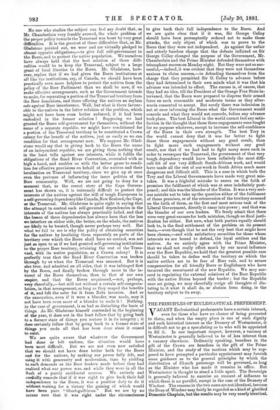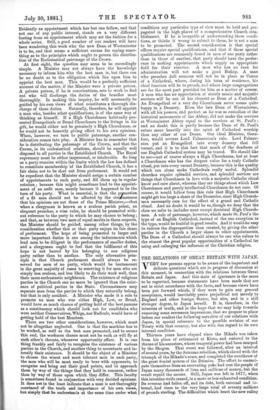THE PRINCIPLES OF ECCLESIASTICAL PREFERMENT.
-VACANT Ecclesiastical preferments have a certain interest, even for those who have no chance of being presented to them, and when the empty place is one of such dignity and such historical interest as the Deanery of Westminster, it is difficult not to go a speculating as to who will be appointed to fill it. In one important respect, however, a vacancy at Westminster is generally believed to be of .less interest than a vacancy elsewhere. Ordinarily speaking, benefices in the gift of the Crown are benefices in the gift of the Prime Minister, and the study of the motives which may be sup- posed to have prompted a particular appointment may furnish some guidance as to the general principles by which the distribution of Church patronage will be governed, so long as the Minister who has made it remains in office. But Westminster is thought to stand a little apart. The Sovereign is generally believed to exercise an amount of influence to which there is no parallel, except in the case of the Deanery of Windsor. The reasons in the two cases are not identical, because the Dean of Windsor may fairly be regarded as a kind of glorified Domestic Chaplain, but the results may be very nearly identical.
Evidently an appointment which has but one fellow, and that not one of any public interest, stands on a very different footing from an appointment which may set the fashion for a whole series. Still, a good number of our readers will have been wondering this week who the new Dean of Westminster is to be, and that seems a sufficient excuse for saying some- thing as to the principles which ought to govern the distribu- tion of the Ecclesiastical patronage of the Crown.
At first sight, the question may seem to be exceedingly simple. A Minister may not always have the knowledge necessary to inform him who the best man is, but there can be no doubt as to the obligation which lies upon him to appoint the best man. This would be a perfectly sufficient account of the matter, if the Minister were a private patron. A private patron, if he is conscientious, sets to work to find out who will discharge the duties of the benefice most thoroughly. In making this inquiry, be will necessarily be guided by his own views of what constitutes a thorough dis- charge of these duties. Naturally, therefore, he will appoint a man who, besides other qualifications, is of the same way of thinking as himself. If a High Churchman habitually pre- sented Evangelicals or Broad Churchmen to the livings in his gift, he would either not be genuinely a High Churchman, or he would not be honestly giving effect to his own opinions. When, however, we turn to public patronage, another con- sideration comes into play. A Minister has to remember that he is distributing the patronage of the Crown, and that the Crown, in its ecclesiastical relations, should be equally well disposed to all parties in the Established Church. The Royal supremacy must be either impersonal, or intolerable. So long as a party remains within the limits which the law has defined to constitute membership of the Established Church, it has a fair claim not to be shut out from preferment. It would not be expedient that the Minister should assign a certain number of appointments to each party, and fill them up in regular rotation ; because this might sometimes lead to the appoint- ment of an unfit man, merely because it happened to be the turn of his party. What is essential, is that the pr motion of a fit man should not be affected by the cireimstance that his opinions are not those of the Prime Minister,—that when a clergyman is known as a zealous parish priest, an eloquent preacher, a wise ruler, he should be promoted with- out reference to the party to which he may chance to belong ; and that, as between two men of equal merits in these respects, the Minister should be guided, among other things, by the consideration whether this or that party enjoys its fair share of preferment. The hope of being promoted to larger and more important duties is one among the inducements which lead men to be diligent in the performance of smaller duties, and a clergyman ought to feel that the fulfilment of this hope is not barred by his belonging to one religions party rather than to another. The only alternative prin- ciple is that Church preferment should always be re- served for men of no party, which would be tantamount in the great majority of cases to reserving it for men who are simply less zealous, and less likely to do their work well, than their more enthusiastic neighbours. The existence of religious parties in the Church can no more be ignored than the exist- ence of political parties in the State. Circumstances may separate men from the parties to which they naturally belong, but that is only accident. A Minister Who made it a rule to promote no man who was either High, Low, or Broad, would have as much chance of getting hold of the best parsons as a constituency which should look out for candidates who were neither Conservatives, Whigs, nor Radicals, would have of getting hold of the best Members.
There are two other considerations, however, which must not be altogether neglected. One is that the machine has to be worked, as well as the best man promoted, and to secure this end, the workmen chosen must not be such as will fly at each other's throats, whenever opportunity offers. It is one thing frankly and fairly to recognise the existence of various parties in the Church, and another thing to accentuate and in- tensify their existence. It should be the object of a Minister to choose the wisest and most tolerant men in each party, the men who will be most ready to bear with opponents, to recognise and bring out their good points, and to approach them by way of the things that they hold in common, rather than by way of those upon which they differ. This faculty
is sometimes found in conjunction with very decided opinions. It does net in the least indicate that a man is not thoroughly convinced of the truth and importance of his own views; but simply that he understands at the same time under what
conditions any particular type of view must be held and pro- pagated in the high places of a comprehensive Church esta- blishment. If he is incapable of understanding these condi- tions, or thinks it wrong to submit to them, he is not a man to be promoted. The second consideration is that special offices require special qualifications, and that if these special qualifications are commonly found in men of one party rather than in those of another, that party should have the prefer- ence in making appointments which supply an appropriate field for their exercise. A man who has no turn for administration will not make a good Bishop. A man who preaches dull sermons will not be in place as Canon of a Cathedral, where, during his term of residence, his chief function will be to preach, and where large congregations are for the most part provided for him as a matter of course. A man who has no appreciation of stately music and majestic services will be out of his element as Dean of a Cathedral. An Evangelical or a very dry Churchman never seems quite happy in a Deanery. Even the late Dean of Westminster, with all his powers, and perfect as he was as custodian of the historical monuments of the Abbey, did not make the services at Westminster Abbey equal to the services at St. Paul's ; and no doubt this is partly because the Dean of St. Paul's enters more heartily into the spirit of Cathedral worship than any other of our Deans. Our ideal Minister, there- fore, would reverse Lord Palmerston's rule. Lord Palmer- ston put an Evangelical into every deanery that fell vacant, and it is to this fact that much of the deadness of our English Cathedral system may be traced. We should like to see—not of course always a High Churchman, but at least a Churchman who has the deepest value for a truly Catholic ritual, put into every vacant Deanery, because this is the quality which can alone make Cathedrals really useful. Splendid churches require splendid services, and splendid services are things that Churchmen in love with a majestic Catholic ritual know and care about, whereas they are things about which Low Churchmen and purely intellectual Churchmen do not care. Of course, it would follow from this rule that High Churchmen might get too large a share of the Deaneries, since High Church- men necessarily care for the effect of a grand and Catholic ritual. And no doubt it would be so, though we deny that the class we refer to includes none except doctrinal High Church- men. A rule of patronage, however, which made St. Paul's the type of an English Cathedral, instead of the one exception to the type, would be fruitful in good results. And it wouldle easy to redress the disproportion thus created, by giving the other parties in the Church a larger share in other appointments. The Dean of a Cathedral should always be one who values to the utmost the great popular opportunities of a Cathedral for using and enlarging the influence of the Christian religion.



































 Previous page
Previous page